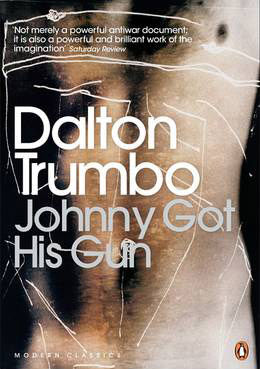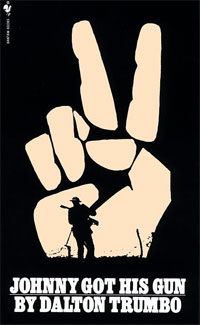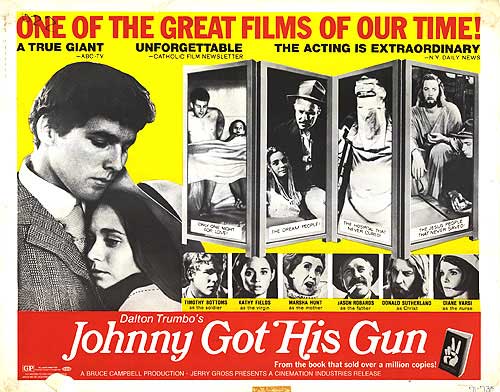




Murder Slim Review: JOHNNY GOT HIS GUN
A 1939 NOVEL AND A 1971 FILM BY DALTON TRUMBO
Before we go on, it's important to say Dalton Trumbo was an interesting guy. It's well worth checking out the documentary TRUMBO (2007). Trumbo was the scriptwriter of ROMAN HOLIDAY, THE BRAVE ONE, GUN CRAZY and SPARACUS. He won two Oscars, but is perhaps more famous for being one of the blacklisted "Hollywood 10" during the 50s. McCarthy's loopiness also took Edward Dmytryk (from the excellent MURDER, MY SWEET and CROSSFIRE) out of filmmaking for a brief while. Both survived, but interestingly Trumbo never gave in. Trumbo was associated with anti-fascist groups in the 30s and 40s, which was tied into to his fervent hatred of war rather than a love of communism. He argued the point ferociously and intelligently, even when it led to his imprisonment.
As such, JOHNNY GOT HIS GUN (1939) is Trumbo's most personal piece. It's a testament to Trumbo's intensity and self-reliance... and one of those novels which will stay with you. The central concept is damn powerful. What happens to a soldier (Joe) so intensely injured in a mortar attack that he is little more than a breathing, thinking corpse? What happens to someone who can't speak, hear, taste or talk? And what happens when the person also has no arms, no legs, no eyes and no mouth?

--- 
It would be interesting to read the novel without any previous idea of its content, but it'll be virtually impossible to find readers like that. It's actually a shame, because the book beautifully (and tragically) draws us through Joe's discovery of his condition. He can feel phantom pains from his limbs before he realises they're gone. Just as he thinks his sight and hearing will gradually return after the shellshock wears off. And, of course, in his dreams he is whole again. The first section of the book sees Joe slipping in and out of consciousness, lost between dreams and reality. This, he realises, is due to the medication he's on as they patch him up and keep him alive.
My only problem with the book of JOHNNY GOT HIS GUN is that the periods of dreaming seem a little too loose. But that's coming from a reader who knew where the story was going. The concept is so strong you want to get to the horrible meat of the story. How the fuck is Joe going to stay sane? And can he find any means of escape?
When this does kick in, Trumbo's comma-free writing is superb... so much so you can sink a little into Joe's mind and body. Joe's first task is to learn time. He feels the sun against his skin. He feels the vibrations of the nurses coming and going at regimented times. He desperately tries to count between the visits, to try and place himself in the world. If he has time, he has structure. And if he has structure, he can better imagine the world outside him.
Of course, the novel is crushingly sad. Joe has no mouth to scream with, but he also has nothing else to signal his dismay. He can rock and hit his head back and forth, but the doctors and nurses will think him brain-damaged rather than distraught. The final section of the book is Joe's desperate attempt to communicate. The pages will turn like lightning, as you pull for Joe to break out of his body.
After the initial 80 pages or so, JOHNNY GOT HIS GUN is a great read. It avoids being sentimental and cloying, which is the hardest part of a novel like this. The memories of Joe's lost gal are engagingly real and clumsy. And the same is true of his debates with God. Joe never feels over-smart or over-stupid. As a result, it's much easier to empathise with the guy. If you're in the mood for a depressing but thought provoking read, make JOHNNY GOT HIS GUN your next pick-up.
The movie is a different story. Just a few years before his death, Trumbo wrote and directed the adaption of JOHNNY GOT HIS GUN (1971). It's easy to see why the film was made in the early 70s. Although initially about WWI, the novel was adopted by Vietnam protesters, and the image of Joe Bonham has become an icon of the anti-war movement. Scenes from JOHNNY GOT HIS GUN were even "immortalised" in Metallica's 2 OF ONE - which is a little like having your obituary carved into shit. Please check out the movie over the Metallica video... but, still, don't get you're hopes up. It's only passable, and fails to capture the same energy as the book.

The main problem with the film is that Trumbo isn't a director. It's an oddly flat movie, and it's poorly edited. There are some awkward lurches into poppy 60s editing and wacky angles, flicking around the bed-ridden character from weird angles to represent confusion. But it doesn't flow correctly, and fails to build tension.
The concept doesn't work visually. The nature of Joe's plight is that we often just have shots of his masked face. Despite extensive narration from Joe, it's virtually impossible for Trumbo to get across the detail of Joe's feelings in the limited space of a film. The book has time to reveal things more gradually - and more achingly - while the movie has to skim and rush.
JOHNNY GOT HIS GUN (1971) isn't a terrible film. The visuals sometimes escape into flashbacks, but while some of these are touching (Joe staying with his girlfriend), other fall flat (Joe's discussions with a disjointed Jesus). There's only one really striking image in the film - that of Jesus (Donald Sutherland) wildly riding a train of dead people into the infinite. It's a movie where you see Trumbo's intensity bubbling under the surface, yet never finding a way to fully break through.
It sounds ghoulish, but maybe the true problem of the movie is that Joe is always under his sheets. The limitations of the special fx mean that you never fully see the torso of Joe, and you never see under his mask. The movie needed that visual shock value to capture the complete despair conveyed so well in the book. As a result, the book is the only one that packs the punch that JOHNNY GOT HIS GUN deserves.
Review by Steve Hussy
MurderSlim.com







